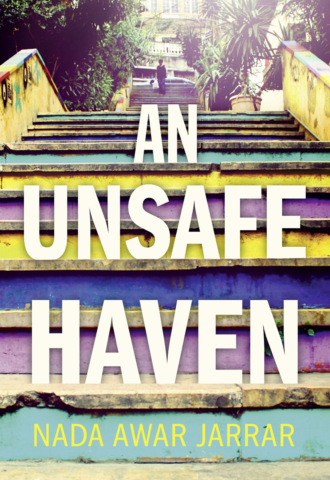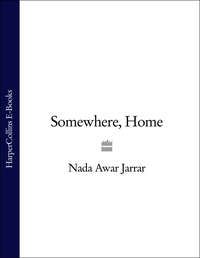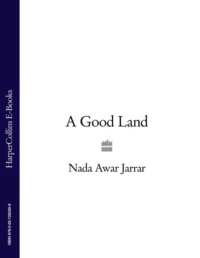
Полная версия
An Unsafe Haven

AN UNSAFE HAVEN
Nada Awar Jarrar

Copyright
The Borough Press
An imprint of HarperCollinsPublishers
1 London Bridge Street
London SE1 9GF
www.harpercollins.co.uk
Published by HarperCollinsPublishers 2016
Nada Awar Jarrar asserts the moral right to be identified as the author of this work
A catalogue record for this book is available from the British Library
First published by HarperCollinsPublishers 2016
Cover layout design: Holly Macdonald © HarperCollinsPublishers Ltd 2016. Cover photography © Mario Ramadan/EyeEm/Getty Images (steps) and Shutterstock.com (texture)
This novel is entirely a work of fiction. The names, characters and incidents portrayed in it are the work of the author’s imagination. Any resemblance to actual persons, living or dead, events or localities is entirely coincidental.
All rights reserved under International and Pan-American Copyright Conventions. By payment of the required fees, you have been granted the non-exclusive, non-transferable right to access and read the text of this e-book on-screen. No part of this text may be reproduced, transmitted, down-loaded, decompiled, reverse engineered, or stored in or introduced into any information storage and retrieval system, in any form or by any means, whether electronic or mechanical, now known or hereinafter invented, without the express written permission of HarperCollins e-books
Source ISBN: 9780008165017
Ebook Edition ©July 2016 ISBN: 9780008165031
Version: 2016-06-01
Dedication
For Bassem,
With all my love.
Table of Contents
Cover
Title Page
Copyright
Dedication
Chapter 1
Chapter 2
Chapter 3
Chapter 4
Chapter 5
Chapter 6
Chapter 7
Chapter 8
Chapter 9
Chapter 10
Chapter 11
Chapter 12
Chapter 13
Chapter 14
Chapter 15
Chapter 16
Chapter 17
Chapter 18
Chapter 19
Chapter 20
Chapter 21
Chapter 22
Chapter 23
Chapter 24
Chapter 25
Chapter 26
Chapter 27
Chapter 28
Chapter 29
Chapter 30
Chapter 31
Chapter 32
Chapter 33
About the Author
Also by Nada Awar Jarrar
About the Publisher
Chapter 1
They are still on daylight saving and the light, soft and hesitant, comes early, through the gap in the curtains and on to the bed, shaping itself to the contours of their bodies, gently waking her.
Peter does not stir when she sits up. She looks at him, his features in repose beautiful to her, fair skin unblemished, his greying hair fine as silk, an implied calmness to his demeanour even in sleep that still moves her after so many years.
She gets out of bed carefully, puts on her dressing gown and looks back to make sure she has not disturbed him. In the kitchen, Anas is already sitting at the breakfast bar, hair ruffled, his eyes, when he looks up from behind his glasses, uncharacteristically flat.
—Anas, Hannah says quietly. You’re up early.
He does not respond.
She places her hand over his and feels a slight tremor in it.
—Is everything all right?
He squeezes his eyes shut and shakes his head. She puts an arm around his shoulder and, feeling him shudder, realizes that he is crying.
—Anas, please tell me what’s the matter. You’re scaring me.
He finally looks up at her.
—It’s Brigitte, he says in a whisper. She’s left Damascus and taken the children with her.
She lifts both hands to her mouth.
—I don’t understand, she exclaims. Where did they go? What happened?
There is a pause before he can reply.
—I telephoned them several times yesterday but no one was in. I’d been worried since that car bomb exploded in our neighbourhood after I left. I wanted to make sure they were all right, but when I called my mother late last night, thinking they might have gone there, she said they were gone.
—Gone?
A thought occurs to Hannah though she does not say it out loud. Please God they haven’t been kidnapped, she thinks. It is not unusual for people to go missing in Syria. Since the revolution and consequent civil war began, there have been tens of thousands of abductions.
—It’s not what you think. Anas has read her thoughts. Our neighbour downstairs saw the taxi we always use parked outside for them. They had lots of luggage. When my mother asked the driver later, he said he’d taken them to the airport.
—Thank God. She breathes a sigh of relief. Where do you think they went?
—I’m sure she went to her parents in Berlin. Where else would she go?
—So you’re going to call them?
He shakes his head.
—My in-laws moved recently and I don’t have their number. I didn’t think I’d ever need to get in touch with them without Brigitte there.
—At least you know they’re safe, Anas. Hannah is not sure what else she can say in the way of comfort.
—She waited until she knew I’d be coming here for the exhibition and left without saying anything about it. There is bitterness in his reply. She knows I would never have agreed to it.
—Brigitte has talked about leaving before?
He shrugs.
—Since the fighting began, whenever the subject came up. I always told her Damascus is home and I would not abandon it no matter what happened.
He waits for a moment until Hannah begins to feel a hint of his anguish.
—I also said I would never allow the children to leave. I reminded her that they would always be Arab.
—But, Anas, you can’t be surprised that she would want to get the children out of a country at war? Surely, you can’t.
—She doesn’t feel the way I do about Syria, he says. Why should she? After all, it’s not her country.
Hannah begins to ask him if he really believes any mother, regardless of her nationality, would not choose to remove her children from danger, no matter the cause, but decides to remain silent.
She sits down and feels a now familiar hopelessness rising through her chest, gloom that comes from her many years as a journalist writing about the affairs of a region constantly in turmoil. Silently, she gathers together the thoughts that she will later write down to use in the stories she is always working on.
In the past five years, the Arab world has swelled and raged as dictators have fallen and people in their hundreds of thousands have been killed and millions of others displaced. In Syria and in Iraq, in Egypt and Libya, and in the farther reaches of the Arab Gulf, we have looked on in horror while humanity appears to stumble over itself; and Lebanon, in the wake of all this turmoil, teeters on the brink. There are moments when it seems too big, too unfathomable and overwhelming a reality to take on, when I feel as if I – along with the region I once believed in – am moving through mud, fearful and hesitant, unable to take that next step towards release.
Living in Beirut can be deceptive; it offers a false impression of safety and permanence in the midst of all the upheaval. We feel the direct consequences of the tragic events in Syria, but it is hardly by choice. Is Brigitte wrong in distancing herself from what is going on? And are we, all of us, mistaken in standing by, believing ourselves helpless like this?
There is something else to be learned from the experience of this situation, something to do with the conflict’s essential incongruity, even to those of us who are closest to it. Nothing about brutal battles is acceptable, nor are they a normal function of human interaction. This is how people diverge in their perceptions. For the suicide bombers who have been striking in the heart of Beirut or Baghdad, in Benghazi or Sanaa, in heavily populated areas and at times of day when ordinary people are getting on with their lives and the highest number of casualties is likely to occur, for these extremists, there is no such thing as everyday life, nothing in their psyche that points to normality and recognition of the other as legitimate and worthy.
She sighs and places a hand on Anas’s arm.
—You’re in despair, I know, habibi, she says quietly. You have the sensitive soul of the artist that you are and are feeling overwhelmed right now. But things will work themselves out, you’ll see. We’ll find your family. I know we will.
*
During those foggy moments before complete wakefulness, Peter hears murmurings, imagines himself going outside in search of them, feet bare and his eyes, unbelieving, squinting in the breaking sunlight that bathes the furniture and floors.
It is only Hannah and Anas talking, he realizes.
Getting out of bed slowly, he stands still for a moment and listens further, the voices beyond gently rising and falling. He smiles to himself. It pleases him that his wife and good friend should get on so well.
When he joins the others in the kitchen a short time later, he is already showered and dressed.
—Morning, hayati, says Hannah. Sit down and let me pour you some coffee.
Peter looks at Anas but he has a hand over his eyes.
—Is everything all right? Peter asks. Anas, are you OK?
Hannah hands him his coffee and tells him what has happened.
He sits down and waits for his friend to look up. Anas is an extraordinarily handsome man. He has the brooding features characteristic of many Arabs, Peter believes, but in him they are softened by luminous eyes and a palpable quietness of spirit.
—How did she manage to get them out without your permission? Peter eventually asks. Surely they would have stopped her at the airport.
—If anyone did try to stop her, she would’ve paid them to keep quiet, Anas says. Anyway, they’re not too strict about things like that these days. Lots of people who have foreign passports and can afford it are leaving.
—At least we know they’re safe, Hannah interrupts the ensuing silence. Brigitte will get in touch soon, I’m sure.
—Do you have any idea where she might be? Peter persists.
—I’m pretty certain she’ll have gone to Germany to her parents. Still, it depends on whether or not she wants me to find her at this point. She’s got lots of friends to stay with.
Peter senses hesitation in Anas’s voice.
—We can try to find her.
Anas puts his cup down on the bar in front of him.
—I’d rather she got in touch first, he says. I don’t want to rush her. She’s probably confused and very angry with me right now.
—No matter how she feels, says Peter quietly, they are your children, Anas, and you have a right to know where they are.
A moment later, he wonders if this was the right thing to say to a man in such a vulnerable state. Perhaps empathy, rather than rational thinking, is what he needs right now.
Peter looks at Hannah but her expression tells him nothing. He sighs and lifts his cup to his mouth.
There are times when he harbours doubts about his true nature, wonders whether or not being a physician has made him impervious to the pain of others, or if, even with those to whom he is closest, he has developed a studied indifference, a metaphorical second skin that protects him from the dilemmas of compassion. Some of this disconnection, he knows, he brought with him from America and a childhood home where a show of emotions was discouraged. During periods of clarity, he has seen that, in trying hard over the years to adapt to a culture so different from his own, he has lost the ability to appreciate the subtle ups and downs of human relationships, a shortcoming he is reluctant to acknowledge openly but which nonetheless shapes his everyday dealings with others. Once or twice, when he has tried to approach Hannah with his suspicions, the fear that she might confirm them and judge him further for his apparent indifference has stopped him. At times distrustful of his feelings, he has become adept at avoiding them, working too-long hours to pay proper attention to anything else or simply putting on a façade of detachment that leaves him only in sleep.
As the situation in Lebanon has worsened and Hannah’s anxieties continue to increase, he has been close, at times, to admitting a distance even from her, a pulling away from the concentrated passions she harbours, which are a good portion of her essential self. And although he is troubled by Anas’s sadness now, he is inclined to leave the dealing with it to Hannah, for whom extreme emotions are an everyday occurrence.
It is often like this, he thinks, my true self appears to me only in bits and pieces, like flashbacks in a film, incoherent but sharp-edged, revealing as much as they manage to hide from me. That surely is why I am bewildered at times like these.
He looks over at his wife again before continuing.
—Look, Anas, I have a friend who is with the International Red Cross here. Maysoun is Iraqi and works mostly with refugees from there, but I’m sure she can find out for us. She told me they have a register of people fleeing war. She’d be able to trace anyone who has left Syria. What do you think?
—I don’t suppose it would do any harm to find out, Hannah says, looking at Anas. Let Peter do this and then we can figure out where to go from there.
Anas smiles.
—You are good friends, he says. Once the exhibition opens and I can go back to Damascus, I’ll be able to think more clearly and decide what to do …
—Wait a minute, Peter interrupts him. You don’t have a German passport, do you?
Anas shakes his head.
—I’m pretty sure the embassy in Damascus will have closed down. If you decide you want to go to Germany to find your family, you’ll have to get your visa from the embassy here.
—He’s right, says Hannah. You can’t possibly think of going in and out of Syria just yet. Besides, there have been battles going on very near Damascus the last few days and it’s dangerous. Stay on with us for a while longer, until we can work out what to do.
Anas hangs his head. Peter looks on as Hannah puts her arms around him and, for a brief moment, is conscious of the rhythmic beating of his own heart.
When Anas goes inside to get ready to leave for the gallery, Peter turns to Hannah.
—I can’t believe Brigitte would leave like that without telling Anas about it, he says.
—Maybe she was worried he’d use the children as an excuse and prevent her from leaving. He could have contacted the authorities and had them stopped at the airport. She wouldn’t have been allowed to take the children away without his consent.
—I can understand her wanting to save the children from the war, Hannah. But she should have found a way to let him know she was planning to escape. She could even have come here with the children instead of disappearing like that.
He grabs his jacket and starts for the front door.
—By the way – he turns to ask her – are you visiting another refugee encampment for your articles today?
Hannah shakes her head.
—I can’t do any work after what has happened. Anas is absolutely devastated and I need to be with him.
—I realize he’s upset. But nothing we do at this point is going to make him feel better.
She looks at him with what seems like reproach.
—He can’t be left to deal with this on his own, Peter.
—Anas is going to feel upset no matter what we try to do. He has to cope with the situation in his own way and he’s aware we’re here to help whenever he needs it.
—Whatever you might think, I will not leave him today. I have to make sure he’s OK. Then, frowning, she continues quietly: You know, there are times when we seem so different, you and I.
Before he can be alarmed by what she has said, he decides to make a joke of it.
—Just as well we are and I can help tone down your angst, he says.
But she only turns away.
Chapter 2
From the beautiful residential neighbourhood of Abou Roummaneh in Damascus, Anas drives his children to school every morning, stopping the car to let them safely out, then placing their bags on their backs and watching them walk away, his heart leaving with them, the tug of separation lingering as he drives on to his studio on the outskirts of the city, as he sets to work and anticipates release from the everyday, as he dreams.
With Marwan and Rana, he has tried to cultivate a quietness that had been largely absent in his own childhood, in which his parents’ love had been too intense at times, too enveloping to allow him breath. Growing up, he had had the comfort of knowing that whatever the challenges, whether it was anxiety over schoolwork or rejection by friends, whether he got disapproval from strangers or simply felt disconnected from the world around him, whatever the break these experiences caused inside him, there would always be someone or something to put him together again. His mother making his favourite sweets and the pleasure in her eyes as she watched him eat them; his sisters, both older, helping him with homework, often doing it for him while he went out to play; his father insisting, at the end of the school week, that he walk down with him to the old souk to help with the shopping. Once there, Anas became so engrossed in the surrounding activity and displays, felt so much a part of them, that he forgot his troubles.
Yet he had felt stifled by this closeness at times, and recalled occasional moments of aloneness that stood out as bright and exceptional: the sun on his back as he bent down on the terrace to play, undisturbed, with a new toy, the joy in that anticipation, or at night, a little while before sleep, shutting his bedroom door and sensing in this instantaneous, temporary solitude the opportunity to be utterly himself, feeling the relief in that, the release. He has always understood that it is exactly this ability to disengage, with fluidity and without notice or regret, that makes way for the artist in him, that defines his deepest being.
He remembers the joy his parents had felt when in his final year at school he passed his baccalaureate exams with distinction, the pride and the boasting, their expressions of hope for his future – medicine perhaps, or law, they advised him –and then their disappointment when he had refused, their despair that he would be willing to give up the opportunity to elevate his standing and that of his family in a watchful and highly critical society. But the urge in him to create, to portray in shape and in colour what defined his essential being was too strong to ignore, and for several years, during which Anas and his parents hardly communicated, he had taken on menial jobs that allowed him to pay for occasional art classes and materials, until the day he was able to announce to them that he had won a scholarship to study art in Germany and their resolve was finally broken.
Anas is aware that in defying his parents’ plans for him as the only son in a traditional Arab family, he became stronger and more determined to succeed as an artist. But this is not a fight he wants to engage in with his children, not the path towards fulfilment that he wishes for them. He sees instead a flexibility in their outlook that they have gained from their mother; this pleases but also at times frustrates him. It is a mirror he is not always willing to look into.
He works on the top floor of an ageing three-storey building, once the pride of Syrian design, with an open stairwell that looks on to a garden overgrown with plants and a small pond that is long dry; and standing right outside his front door, growing in a huge, ancient pot, is a beautiful jasmine bush that dies gracefully in winter and in spring fills the evenings with its perfume. Inside the spacious, high-ceilinged rooms of the apartment are the light and shadows he has always sought, a weightless glowing, and at its edges, a muted gloom, the suggestion of colour that serves as his inspiration.
He spends the best hours of his day sitting at a wooden table placed directly beneath a large, open window, painting with colours he has painstakingly blended together or sculpting materials which he manipulates with nervous hands, slowly but surely drawing the outlines of his better self, he knows, the man he sees clearly in his mind’s eye but who in lesser moments appears dulled and ordinary.
Anas has finally found the recognition that a handful of Syrian and Iraqi artists now enjoy thanks to a greater interest in their work around the world, a recognition that is deserved. However, he comforts himself with the thought that increased material comforts and growing demand for his pieces have neither influenced his outlook nor made him change his work habits. He prides himself on that, trusting that his instincts will continue to carry him through what might turn out to be only a temporary rise. He knows that art is the one thing, above all else, that gives him life.
But if his work has achieved success, his personal life – more specifically his relationship with his wife – has not fared well. That too is a long story which he cannot bring himself to talk about, even to his closest friends.
He had been at art school for almost a year when he met Brigitte at a gathering in the home of a mutual friend. She was tall and attractive, like many of the women he had met since his arrival in Germany, and fair: a striking contrast to his own colouring that appealed to him. Yet he had sensed something about her from the first: a willingness and humility he admired; an interest, too, in him that went beyond that initial attraction. Their affair had been passionate and serious in a way that was unfamiliar to him, demanded from him wisdom that his upbringing and consequent experience had not prepared him for, a view of relationships, of women, that was new and challenging. They had joked once about their closest moments being as lessons in love, with Brigitte as the teacher and he the willing student.
When they married not long after meeting, she had told him she looked on the prospect of moving to Damascus to live and raise a family as a welcome adventure. If she loved her husband so much, she admitted, it was in large part because she was fascinated with his culture, longed to discover a world far outside her own European upbringing.





